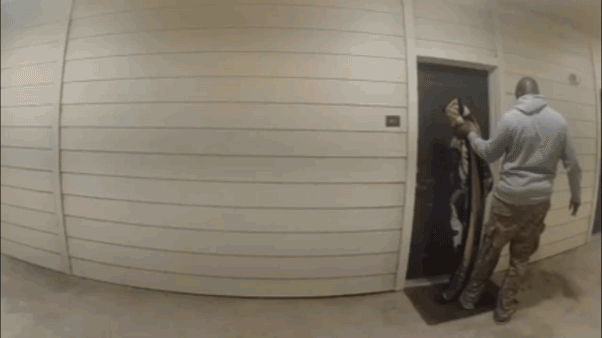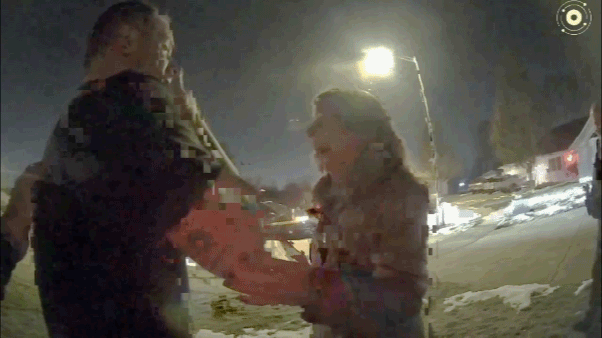FORT YATES, N.D. – A nationwide propane shortage has hit an American Indian reservation that straddles the Dakotas' border particularly hard. A more than doubling of the fuel's cost has crippled efforts to stay warm — and alive — through the harsh winter at the Standing Rock Reservation where most people rely on propane to heat their often ramshackle homes.
The reservation is on the wind-swept Northern Plains where there is little to block the icy gales that whip in from the northwest and create wind chills as low as 50 below. Many residents live in mobile homes, some with ill-fitting doors, others with boards tacked up where the windows should be, or deteriorating roofs that leak much-needed warmth.
The propane crisis at the reservation can be summed up in the story of Debbie Dogskin, a healthy 61-year-old woman who died this week while house-sitting for a friend in a rundown mobile home with an empty propane tank.
"We think she just fell asleep and died," said her mother, Sara Dogskin, tears trickling from the corners of her eyes as she stared out the dining room window of her house just a few blocks from where her daughter died early Tuesday.
Preliminary autopsy results released Friday did not identify a cause of death, but Sioux County Sheriff Frank Landeis said he believes Dogskin froze to death because it was as cold inside the home as out that morning — 1 degree below zero. Dogskin's family said she had taken off some of her clothes, a symptom of the altered state of mind of someone in the advanced stages of hypothermia. Toxicology reports were expected in six to eight weeks.
As the Dogskin family prepared for a memorial service, authorities investigated why there was no propane to heat the home. Her mother said Dogskin, who was known for helping others, likely felt a sense of responsibility to stay in the freezing home and keep watch over it for her friend.
"She should have come back," Sara Dogskin said. "But my daughter, she would never say no."
Propane — a by-product of natural gas processing and petroleum refining — has been in short supply in the U.S. since late last year after farmers burned up more than usual to dry out a late wet harvest. Compounding that, less propane has been arriving from Canada because of higher demand there, and the deadly cold winter in the U.S. has increased demand and driven up prices here.
A gallon of propane is about $3.90 per gallon in the U.S. this week, down about 12 cents over the week but up about $1.59 from last year at the same time, according to U.S. Energy Information Administration data released Wednesday. Ken Snider, who drives a propane truck for Cenex out of Selfridge, said the price on the reservation this winter peaked at $4.65 a gallon.
The shortage has been particularly problematic on the 3,600-square-mile reservation, which has no natural gas lines and where using electricity to heat homes can be too expensive for many impoverished families, according to Tribal Chairman Dave Archambault II. As many as 5,000 homes on the reservation rely on propane.
Andrew Littlemoon Jr., 57, said he worries about maintaining a propane supply through the end of the winter. The disabled military veteran is unable to work. He and his wife rely on tribal aid and do what they can to conserve fuel in their small, poorly insulated rental house.
"We're using electric heaters, plus when we cook on the propane stove, we use that to help heat up the house," he said.
Many reservation families are on fixed incomes and can no longer afford propane.
"As far as supply goes, we haven't had any problems," said Snider, the propane truck driver. "The normal person — how do you afford the price? I filled a guy's 1,000-gallon tank, and $2,475 is what it cost him, and the tank wasn't even empty."
The tribe has opened six shelters across the reservation, and the Red Cross provided cots, blankets and food. The shelters have not been heavily used so far, in large part because the tribe has provided propane through a program that helps the needy pay to heat their homes. But that money is limited. Budget cuts mean the tribe received $1.5 million from the federal government this winter, down from $2.5 million last winter.
"We do have resources, but when you have a lot of people below 20 percent (propane in their tanks), you get a big, long list," Archambault said. "And it's a temporary fix, a Band-Aid."
Chase Iron Eyes, an attorney and American Indian advocate who grew up on Standing Rock, hopes he has a solution. He has launched a fundraising program dubbed "Heating the Rez" through www.indiegogo.com .
His initial goal is to raise $50,000 to fund a pilot project to outfit 20 homes with heat stoves that burn pellets made from natural materials that can be found on the reservation, such as wood, cherry pits and grasses.
"If we can start a shift away from market dependence, from prices we can't control, that's the long-term solution," he said. "We need a strategy to grow, produce and manufacture our own heating sources."
The situation was bad enough without a death to augment it, Iron Eyes said.
"I haven't been that shaken up in a long time," he said. "That circumstances had come to a point where as humans, not as Indians but as humans, we allowed somebody to meet their death in preventable circumstances ... I consider it to be a human right. Everyone has a right to a warm house."
___
Follow Blake Nicholson on Twitter at http://twitter.com/NicholsonBlake









































